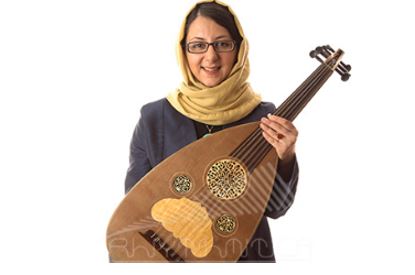Interestingly, two Persian words are combined to create the native Persian fiddle Kamancheh: kaman, which means bow, and –che(h), meaning little (Khosroshahi et al., 64). Kamancheh is a traditional instrument that has a wooden, bowl-shaped resonator covered in a stretched membrane, making it appear similar to a spike fiddle. The four strings on the instrument’s neck are played with a bow. A key element in Persian classical music, the Kamancheh adds to the intricate and rich fabric of the genre. Because of its expressive qualities, which enable players to portray a broad spectrum of emotions, it remains a popular option for solo and group performances. Until the early 20th century, Kamanchehs were typically played with three silk strings. However, more recent models feature four lines, typically tuned either G-D-A-E or E-A-E-A, depending on the piece being played. The musical note produced by Kamancheh differs significantly from that of a violin, which is why Persians find this instrument unique (Week 7 Lecture).

Fig 1. Iranian Kamancheh Parts (Mehraby, 2023)
The barbat is a historically significant ancient Persian lute that became popular in Europe. We learned that “bar” means chest, and “bat” means duck. The instrument is made of walnut, maple, and rosewood with a range of two octaves. It has a round body and a short neck and is frequently referred to as the ancestor of the modern oud. It is usually played with a plectrum and has six strings. The barbat, whose origins are in pre-Islamic Persia, has been instrumental in the evolution of Persian classical music. It adds to the soulful melodies that define traditional Persian compositions with its warm, resonant tones. The barbat has persevered despite obstacles, retaining its cultural significance in Iran’s musical legacy and even gaining its popularity in India. Barbat can help us trace the history of the Sassanid Dynasty (6th Century) and many old paintings. Some of the popular barbat players include Mansour Nariman, Abdolvahab Shahidi, Arsalan Kamkar, and Negar Bouban (Week 7 Lecture).

Fig 2. Negar Bouban with barbat (Week 7 Lecture)
This week’s class notes also talk more about the topics of the 1979 Revolution, Pop music symbols, pre-revolution, Revolution and traditional music, and Persian Classical and Modern Poetry. Characteristics of classical poetry included the use of medieval imagery and the symbolic representation of God, love, wine, women, and pleasure. Although indirectly, symbolism was employed as a form of resistance, the poetry form was preserved for 1000 years. The new wave of poetry adopted free rhythms, dealt directly with social and political issues, and used realistic imagery. Additionally, it stopped avoiding darker imagery and quickly gained widespread acceptance among the general public. These are the dominant topics and end with a review of the Barbat instrument (Week 7 Lecture).
Works Cited
Khosroshahi, F. S., et al. “Modal analysis of the Persian music instrument Kamancheh: An experimental investigation.” Proceedings of. 2014.
Mehraby, R. (2023, January 24). Kamancheh ✅ crafting and playing. Destination Iran. https://www.destinationiran.com/art-crafting-playing-kamancheh.htm
Week 7 Lecture Slides: https://docs.google.com/presentation/d/1i7tOKcshXJNdUOOaYDtHn5weHVohqOxp/edit?usp=sharing&ouid=101951224985260339430&rtpof=true&sd=true
Delivering a high-quality product at a reasonable price is not enough anymore.
That’s why we have developed 5 beneficial guarantees that will make your experience with our service enjoyable, easy, and safe.
You have to be 100% sure of the quality of your product to give a money-back guarantee. This describes us perfectly. Make sure that this guarantee is totally transparent.
Read moreEach paper is composed from scratch, according to your instructions. It is then checked by our plagiarism-detection software. There is no gap where plagiarism could squeeze in.
Read moreThanks to our free revisions, there is no way for you to be unsatisfied. We will work on your paper until you are completely happy with the result.
Read moreYour email is safe, as we store it according to international data protection rules. Your bank details are secure, as we use only reliable payment systems.
Read moreBy sending us your money, you buy the service we provide. Check out our terms and conditions if you prefer business talks to be laid out in official language.
Read more